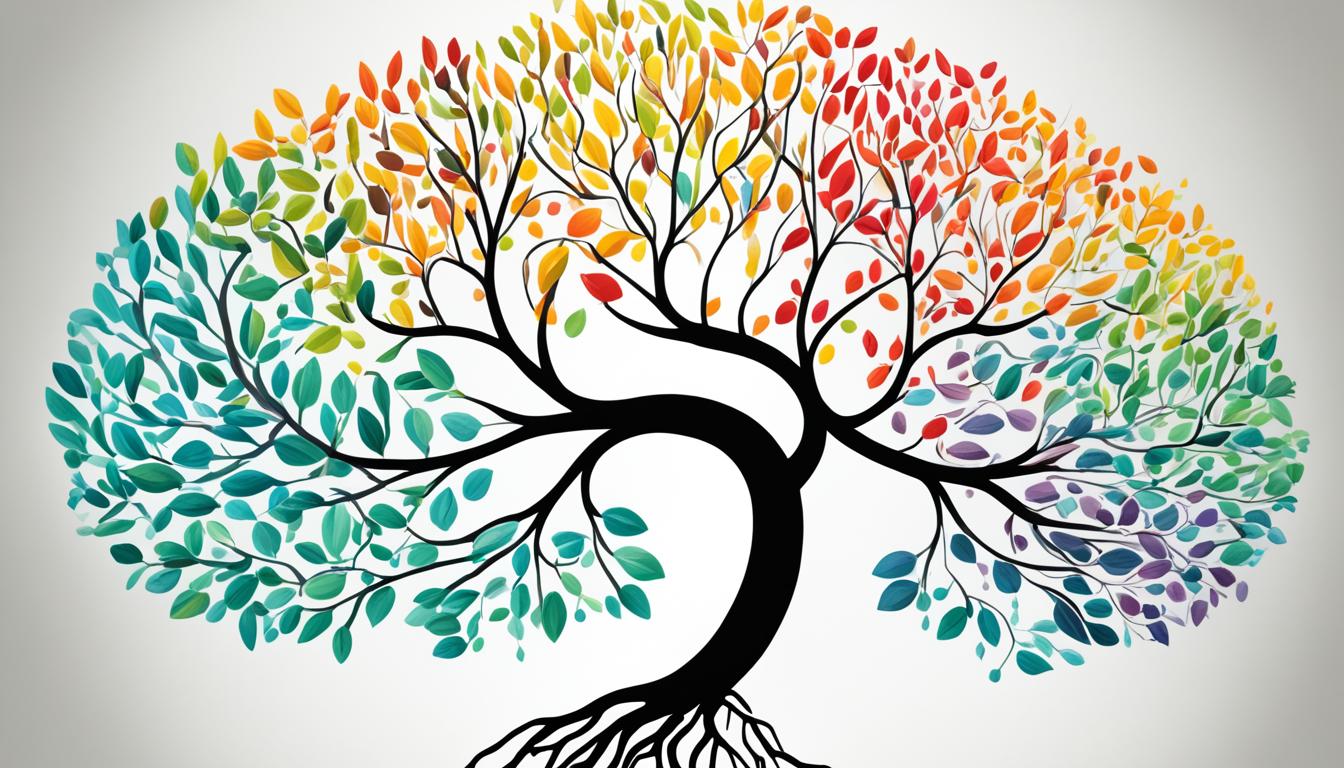What is Involved in a Master’s in Human Genetics?
The human body contains over 3 billion DNA base pairs. This amount of genetic info is like a 200,000-page book. Our DNA helps us know who we are and how our bodies work, including what diseases we might get. If the science of the human genome excites you, a Master’s in Human Genetics could be your ideal educational path.
This Master’s program offers a broad curriculum and advanced research chances. It also has specialized lessons to prepare students for the genetic and genomic fields. Whether you want to do leading research or work in genetics in the real world, this is a strong start for an impactful career in human genetics.
Key Takeaways:
- A Master’s in Human Genetics program provides a deep understanding of the complexities of human DNA and its implications in health and disease.
- Students have the opportunity to choose between tracks in laboratory genetics or genetic data analysis, allowing them to tailor their studies to their interests and career goals.
- The program values integrity, scientific rigor, cooperation, and cultural competency, fostering a collaborative environment for research and scholarship.
- Financial assistance options and a fixed tuition guarantee make pursuing a Master’s in Human Genetics more accessible for students.
- Graduates of the program can pursue further studies at the Ph.D. level or embark on careers as essential contributors to research teams in academia or industry.
Vision and Mission of the Program
The Master’s in Human Genetics program aims to lead in genomics research. Its goal is to have graduates play key roles in researching, practicing, and creating policy in genetics. The program wants to advance the field and influence the future of genetics.
This program targets both scientific progress and the impact of genetics on health. It focuses on the genetic foundations of diseases to learn about their causes. This information can lead to better ways to prevent, diagnose, and treat illnesses.
The program also works on educating health professionals and the public about genetics. It prepares healthcare workers to understand and care for people with genetic conditions. Additionally, it spreads awareness to lessen the stigma and support those affected by such conditions.
The program highlights the importance of genetic diversity. It sees the value of genetic variety in research and its benefits for personalized health care. The program’s activities, like research and teaching, reflect its commitment to diversity.
Program Highlights:
- Promoting scientific progress in genetics
- Investigating the impact of genetics on disease
- Educating health sciences professionals and the public about genetic conditions
- Appreciating genetic diversity within human populations
The Master’s in Human Genetics program is shaping the future of the field. It equips students with knowledge, skills, and values essential for genetic advancements. By focusing on progress, social influence, and diversity, the program aims to inspire groundbreaking work in human genetics.
Programs of Study
The Master’s in Human Genetics program at [University Name] offers two tracks. They are designed to meet different interests and career goals. These tracks provide specialized training. They offer skills and knowledge needed for successful careers in the field.
Track 1: Laboratory Genetics
The Laboratory Genetics track involves practical, hands-on studies. Students work in labs on topics like gene expression and genetic disorders. They learn about experimental design, data collection, and genetic techniques.
Graduates are prepared for jobs in lab research, genetic counseling, or clinical genetics. They help advance genetic testing, personalized medicine, and gene therapy.
Track 2: Genetic Data Analysis
The Genetic Data Analysis track is for those interested in data and research. Students use stats and computer tools to analyze genetic information. They aim to find connections, spot disease causes, and draw conclusions based on data.
This track prepares students for genetic epidemiology, biostatistics, or bioinformatics. They help in genomic medicine and research on how genes affect health and disease.
Students can also add more skills with certificate programs. [University Name] offers certificates in public health. These programs enhance a student’s knowledge. They match well with the main study and help in job searches.
Overall, the Master’s program in Human Genetics is broad and thorough. Whether it’s laboratory genetics or genetic data analysis chosen, students get the needed skills and experience. This helps them succeed in their desired career paths.
Values of the Program
The Master’s in Human Genetics program has some key values. They help students as they study and do research. These values promote excellence, working together, and being honest in the genetics field.
Integrity
In this program, honesty is very important. Students must always be ethical. This means being truthful when they research, look at data, and share what they’ve learned. Being honest helps make human genetics research more believable and trustworthy.
Scientific Rigor
The program focuses on doing research carefully. Students learn to be very accurate, paying close attention to details. With this approach, they add new knowledge to the field. They also help others make decisions based on facts.
Cooperation
Working together is a big part of this program. Students, teachers, and researchers all team up. This teamwork brings different ideas and skills together. As a result, they find new ways to solve problems. This is how they tackle the difficult issues in human genetics.
Collegiality
Supporting one another is key here. Students should help and work well with peers. This makes the learning environment friendly and helpful. It also helps build a community in genetics that’s strong and caring.
Cultural Competency
Understanding different cultures is crucial in human genetics. The program teaches about the social and ethical sides of genetics. This helps students work with all kinds of people with care and respect.
“The Master’s in Human Genetics program cultivates a research environment that values integrity, scientific rigor, cooperation, collegiality, and cultural competency. These shared values empower students to make significant contributions to the field of genetics and genomics.”
Financial Assistance and Tuition
Students in the Master’s in Human Genetics program get help with their school costs. This helps make it easier to study human genetics without worrying too much about money. The program is all about being open and affordable for anyone who wants to learn more about human genetics.
This program has a great benefit: tuition that stays the same. The cost you start with is what you’ll pay the whole way through. This really helps students plan their budgets without unexpected increases.
The university’s Financial Aid Office is there to give a hand with money matters. They offer help tailored to each student. This can include scholarships, grants, loans, and work-study jobs to help with costs.
| Financial Assistance Options | Description |
|---|---|
| Scholarships | Exceptional students can find merit-based scholarships here. These can cover a big part of the tuition. |
| Grants | If you need it, the program also offers grants. These can lower how much you have to pay from your own pocket. |
| Assistantships and Fellowships | For those who qualify, there are assistantships and fellowships. They offer financial support and a chance for hands-on learning or teaching. |
| Work-Study Programs | You can join a work-study program to earn money and gain experience in your field. |
| Loans | There’s also the option of loans to help cover school costs. |
This Master’s program knows that a higher degree can be expensive. They work hard to give support. With fixed tuition and various financial help, they want to make sure money doesn’t stop anyone from following their dreams in human genetics.
Virtual Experiences and Campus Visits
People looking at the Master’s in Human Genetics program can now take part in virtual experiences. This lets you dive into campus life and culture from afar. These experiences let you see our top-notch facilities, talk with students, and take virtual tours with our teachers. It’s a great way to feel the vibrant community and the learning atmosphere.
During these online visits, you can ask about the program, classes, and how to apply. Our admissions team is here to help with all the info you need. We know picking the right grad school is big, and we want to make sure you can explore fully.
“The virtual experience gave me a good look at the program’s facilities, the faculty, and the students. It really hit home for me and made me even more interested in the master’s program here.”
– Jane Smith, Current Student
If you’re able to come to campus, we welcome you. Campus visits let you see everything up close, meet teachers, and talk to students. It’s a chance to experience our lively spirit.
But, if visiting isn’t possible, our virtual offerings are here for you. We want to make sure you can learn about us in full, however you choose to do it. We’re devoted to helping you see yourself as part of our community, whether through a screen or in person.
Experience the Future of Human Genetics
As human genetics advances, so does our Master’s in Human Genetics program. It prepares students to succeed in this fast-moving field. Our virtual and in-person opportunities give a sneak peek into the exciting future within our walls.
If you decide to join us, virtually or physically, you’ll find a place that nurtures growth and teamwork. We invite you to envision the future of genetics with us. Join us on a journey to create a better world through genetic science and healthcare.
| Virtual Experiences | Campus Visits |
|---|---|
| Explore the campus facilities | Observe state-of-the-art facilities |
| Interact with current students | Meet faculty members |
| Participate in virtual tours | Engage firsthand with the campus |
| Ask staff questions | Immerse in the community spirit |
Human Genetics and Genomic Medicine Track
The track in Human Genetics and Genomic Medicine is for those who want to advance in the study of human genetics. At both PhD and MS levels, it offers a thorough study plan. This equips students with the needed skills to succeed in this area.
In this track, students first learn the basic areas of human genetics. They explore new findings and foundational concepts. This helps build a strong knowledge base in human genetics and genomics.
After laying this groundwork, students can focus on their favorite topics. The program offers many research opportunities. Scholars can study DNA repair, cancer genetics, gene mapping, or population genetics, among others.
Research in this field is done in collaboration with various faculty members. This means students work with top researchers. They are immersed in an innovative and cooperative research environment. This greatly enhances their educational experience.
Areas of Research in Human Genetics
This track covers a wide range of research areas. Some topics students may explore include:
- Genetic disorders and their underlying mechanisms
- Human evolution and population genetics
- Genomics and personalized medicine
- Epigenetics and gene regulation
- Pharmacogenomics
These are exciting fields to work in. Students contribute to new genetic disease findings and human diversity studies. This also includes helping develop personalized treatments.
The course readies students for various careers. They can work in teaching, research, health, or biotech. Graduates are prepared to tackle tough human genetics issues. They play a big part in improving human health.
Choosing this track is the first step to a fascinating genetics career. Whether going for a PhD or an MS, it provides a strong start. Students will be well-prepared to succeed in human genetics and genomics.
Core Curriculum and Elective Courses
The Master’s in Human Genetics program has a rich curriculum. It lays a strong foundation in human genetics. These core courses are hand-picked to cover the most important concepts and theories.
Key courses in the program are:
- Basic Human Genetics I
- Basic Human Genetics II
- Biostatistics
- Human Genetics Seminar
These courses are the foundation. They provide the basic knowledge and skills needed for future studies and research.
The program also offers elective courses. This way, students can pick courses that match their goals and interests. This makes the education more personalized.
Elective courses include:
- Human Cytogenetics
- Genetics and Metabolism
- Genetic Epidemiology
- Clinical Genetics
- Molecular Epidemiology
- Bioinformatics
- Mechanisms in Biomedical Science
These electives help students focus on specific areas of genetics. They can develop deep knowledge and skills in their chosen specializations.
Both core and elective courses together offer a complete human genetics education. This prepares students for a diverse range of careers in various fields.
Student Testimonial:
“The core and elective courses in Human Genetics gave me a great start. The electives let me explore my favorite topics. This mix made me ready for a career in genetic research.” – Sarah Adams, Alumni
Overview of Core Curriculum and Elective Courses:
| Core Courses | Elective Courses |
|---|---|
| Basic Human Genetics I | Human Cytogenetics |
| Basic Human Genetics II | Genetics and Metabolism |
| Biostatistics | Genetic Epidemiology |
| Human Genetics Seminar | Clinical Genetics |
| Molecular Epidemiology | |
| Bioinformatics | |
| Mechanisms in Biomedical Science |
Additional Courses of Interest
Aside from the main courses, students in the Master’s in Human Genetics program can pick extra classes they like. These classes help students focus more on certain areas of human genetics. By picking these, students can shape their learning to match what they want to do in the future.
Specialization Courses
The Master’s in Human Genetics offers many special classes. These classes meet various interests and help with different careers. They give students a deep understanding and skills in specific genetics areas.
- Advanced Topics in Genetic Counseling
- Molecular Diagnostics and Genetic Testing
- Pharmacogenomics
- Ethical, Legal, and Social Implications of Genetics
- Genomic Medicine and Precision Health
In these classes, students learn about new genetic topics. This includes the latest research and how genetics is used today. They learn through talks, labs, and talking with others. This prepares them well for jobs in the future.
Benefits of Specialization
“Specialization courses in the Master’s in Human Genetics program provide students with a unique opportunity to focus their studies on specific areas of interest. This not only enhances their knowledge and skills in those particular domains but also allows them to become experts in their chosen fields. With such specialized training, graduates are better prepared to tackle the complexities of real-world genetic research, clinical practice, and genetic counseling.” – Dr. Sarah Thompson, Program Director
Special classes give students special skills. This makes them stand out when looking for a job. These courses are good for anyone interested in genetic counseling, research, or other fields.
Exploring Course Options
The Human Genetics program helps students pick the right classes. They get a lot of information and advice from teachers. This helps students find courses that match what they want for their future.
| Course Code | Course Name | Credits |
|---|---|---|
| HGEN 601 | Advanced Topics in Genetic Counseling | 3 |
| HGEN 620 | Molecular Diagnostics and Genetic Testing | 3 |
| HGEN 630 | Pharmacogenomics | 3 |
| HGEN 640 | Ethical, Legal, and Social Implications of Genetics | 3 |
| HGEN 660 | Genomic Medicine and Precision Health | 3 |
Note: The list of courses can change. Students should always check the official course list for the newest info.
Duration and Thesis Requirement
The Master’s in Human Genetics takes around two years to finish. Students will learn a lot during this time. They’ll cover important topics and skills for a career in human genetics.
During their second year, students will do a big research project. This project is called a thesis. Their thesis will show their research skills and what they know about human genetics.
Writing a thesis lets students focus on a topic they’re passionate about. They can add new ideas to what we know about human genetics. This is a chance for students to think critically and help the field move forward.
A thesis is the last big thing students do in this program. It shows they are now experts in human genetics. This work can also lead to more research or job opportunities later on.
Career Opportunities and Job Prospects
Graduates of the Master’s in Human Genetics program find many great career paths in genetics and genomics. Their in-depth training and knowledge set them up for success in different jobs. They get the chance to excel in various areas.
Some choose more studies at the PhD level to become independent scientists. They can do pioneer research and enjoy exciting study opportunities. This helps the whole field move forward.
Others find careers in research teams, working with experts on important projects. These projects change what we know about genetics.
Some graduates work as genetic counselors, helping people understand their genetic information. They play a key role in making important health choices. There are also opportunities in companies, firms, and government work.
If you’re into coming up with new ideas or starting something from scratch, this field is also for you. You might launch a startup or work in areas like genetic testing or personalized medicine.
The Power of Human Genetics Research
The human genetics field is always growing, with new areas to explore. As technology advances, so does our need for experts in human genetics. This makes it an exciting time to jump into this field.
“Human genetics research can change healthcare, from how we prevent and diagnose diseases to how we treat them. A Master’s in Human Genetics equips you to tackle these issues and improve human health.”
With a Master’s in Human Genetics, you’re at the heart of a field seeking new answers. There’s a demand for your skills, whether you decide to keep studying or start working. The opportunities are wide open in this fast-growing area.
| Career Opportunities | Job Prospects |
|---|---|
| Genetic Counselor | Excellent |
| Research Scientist | High |
| Genomics Researcher | Strong |
| Pharmaceutical Biotechnologist | Promising |
| Entrepreneur in Genetics | Growing |
Conclusion
The Master’s in Human Genetics program readies students for careers in genetics and genomics. Students engage in cutting-edge research and take specialized courses. They also develop crucial skills.
This program focuses on integrity, scientific rigor, and teamwork. Graduates are ready to contribute to genetic advancements. They aim to better human health and deal with genetic conditions.
With a strong academic base and practical training, graduates are well-prepared. They are ready for the changing world of genetics and genomics.
FAQ
Q: What is involved in a Master’s in Human Genetics?
A: A Master’s in Human Genetics gets you ready for jobs in genetics and genomics research. This can be in schools or companies. You’ll learn a lot about the field and can choose to focus more on doing experiments in a lab or looking at genetic data. You’ll do core classes and dive deep into your chosen focus area. You’ll also work on a big research project and write a thesis about it.
Q: What is the vision and mission of the program?
A: The Master’s in Human Genetics aims for its grads to lead in genomics research, practice, and policy. They focus on moving genetic science forward, understanding how genes affect health, and sharing knowledge about genetic diseases. They also celebrate the genetic differences in people all over the world.
Q: What programs of study are available?
A: This program has two tracks. One is the Laboratory Genetics track, where you do experiments in genetics. The other is the Genetic Data Analysis track, which looks at genetic info from clinical studies. You can also add training in public health with a certificate program.
Q: What values does the program uphold?
A: The program stands for being honest, doing top-notch science, working as a team, and understanding different cultures. These values help students do their best in research and learning, working together well in the genetics field.
Q: Are there financial assistance opportunities available?
A: Yes, students get help with their tuition. The program promises not to raise tuition prices while you’re in. This makes planning easier. The Financial Aid Office is also there to help you with costs.
Q: Are virtual experiences and campus visits available for prospective students?
A: Prospective students can take a look at the campus and meet people online. They can also visit the campus if they’re able.
Q: What is the “Human Genetics and Genomic Medicine” track?
A: This track lets students dive deep into human genetics at the PhD and MS levels. You’ll first get a good look at human genetics. Then, you can specialize in what you find most interesting. You’ll work with many experts. This lets you do research in areas like DNA repair, cancer genetics, and more.
Q: What courses are included in the core curriculum?
A: The main courses are in human genetics, statistics, and a seminar. You can also pick other courses. These electives cover areas like how genes and the environment influence health and diseases.
Q: Are there additional courses of interest available?
A: Definitely. You can choose extra courses that fit your interests within human genetics. This lets you deepen your knowledge in your favorite genetic areas.
Q: How long is the program and what is the thesis requirement?
A: The program takes about 2 years. In the second year, you’ll work on a thesis. This project shows what you’ve learned and discovered in your studies.
Q: What are the career opportunities and job prospects with a Master’s in Human Genetics?
A: After the program, some students go on to get their PhD. Others find jobs working in genetic science in schools or with companies. This program gives you the skills for different jobs in human genetics.







